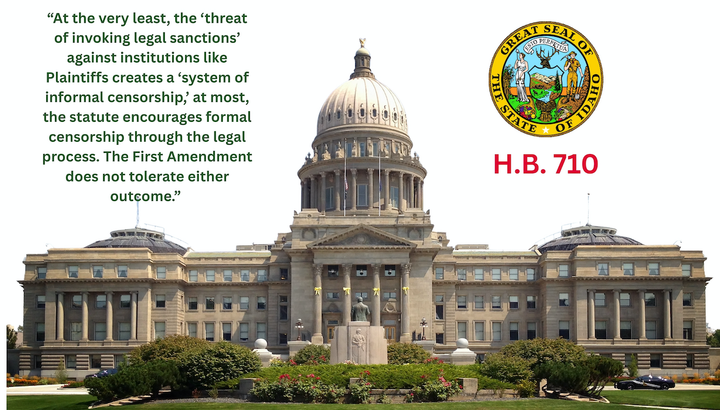Court Permanently Blocks Texas 'Book Rating' Law
The controversial 2023 law was viewed by many as the most high profile of a wave of book banning laws at the state level, and would have required book vendors, as a condition of doing business with Texas public schools, to review books for sexual content.

Texas remains in the spotlight over its book banning activities, but a federal court this week officially scrapped one of the state's most controversial efforts, permanently barring the state from forcing book vendors to rate books for sexual content under a 2023 state law, HB 900, also known as the READER Act.
The summary judgment decision by judge Alan D. Albright was largely academic, coming after Albright orally enjoined the law at an August 31, 2023 hearing, and later issuing a substantive 59-page written opinion and order. A separate section of HB 900 that mandated the creation of statewide library collection standards was not part of the litigation, has taken effect.
"This Court recognizes that the state has a strong interest in what children are able to learn and access in schools, and that children should certainly be protected from obscene content in the school setting," Albright wrote in his October 21 decision. "However, this Court previously enjoined READER in 2023. Facing the same issues, this Court finds the same result: READER misses the mark on accomplishing its goal and is unconstitutional."
Signed by Texas governor Greg Abbott on June 12, 2023, the controversial book rating law was viewed by many as the most high profile of a wave of book banning laws at the state level, requiring book vendors, as a condition of doing business with Texas public schools, to review and rate books—both new and previously sold—for sexual content.
Under the law, books rated “sexually explicit”—that is, books with material deemed “patently offensive” by unspecified community standards—were to be banned entirely from Texas public schools. Books rated “sexually relevant”—books with any representation of sexual conduct—would require written parental permission for students to access them.
Most alarming, however, and also a major part of the law's undoing, HB 900 vested the state with unchecked power to change vendor ratings the state disagreed with, and to bar vendors that did not accept the state's changes from selling to Texas schools.
The lawsuit challenging HB 900 was first filed in July, by a coalition including two Texas bookstores, Austin’s BookPeople and Houston’s Blue Willow Bookshop, together with the American Booksellers Association, the Association of American Publishers, the Authors Guild, and the Comic Book Legal Defense Fund.
Notably, just days after Albright's written opinion and order blocking the law in 2023, a motions panel of the Fifth Circuit issued an administrative stay on Albright’s injunction—a stay not based on the merits of the case—which allowed the law to take effect pending further action by the appeals court. But in a major if narrowly drawn opinion, a three judge panel of the Fifth Circuit on January 17, 2024 upheld Albright's decision.
“We are not persuaded by the State’s characterization of the ratings as a ‘form of consistency review’ that is a ‘purely ministerial task’ instead of an expression of the vendors’ opinion on the subject matter being rated,” the appeals court held in an unequivocal 36-page decision, noting that the law would require booksellers "to undertake a fact-intensive process of weighing and balancing factors to rate library material,” which it recognized as a “highly discretionary” undertaking.
In his summary judgment ruling this week, Albright eviscerated the law.
"The Court agrees with Plaintiffs that READER is compelling speech and is a bookselling regulation. READER does not just set forth preferences for selectively funding book purchases. READER requires Plaintiffs to rate books and accept the TEA’s re-ratings. READER prohibits booksellers from purchasing books from noncompliant booksellers. READER imposes unconstitutional conditions on a party’s ability to contract with the government, because it requires Plaintiffs to surrender their First Amendment rights in order to do any business with public schools," Albright concluded. "The government may not deny Plaintiffs the right to sell books to public schools on a basis that infringes their constitutionally protected interests."

In a statement, Allison K. Hill, the CEO of the American Booksellers Association, praised Albright's ruling, saying Albright’s calling it "good news for Texas readers, schools, and bookstores.”
Still, Texas remains the tip of the spear among states seeking to ban books from schools and libraries, passing SB 13 this year, a controversial measure which bans all sexually explicit books from school libraries and empowers parent oversight councils to choose which books to make available in school libraries.
Furthermore, Albright declined to take up the Plaintiffs’ challenge to the READER Act’s definitions, which have since been incorporated in other legislation, including HB 183, which would have established a new review process library materials in Texas public schools, giving parents more power to seek reviews of books they object to.
HB 183 died in committee in June, but freedom to read advocates warn that it could resurface in a future session.



